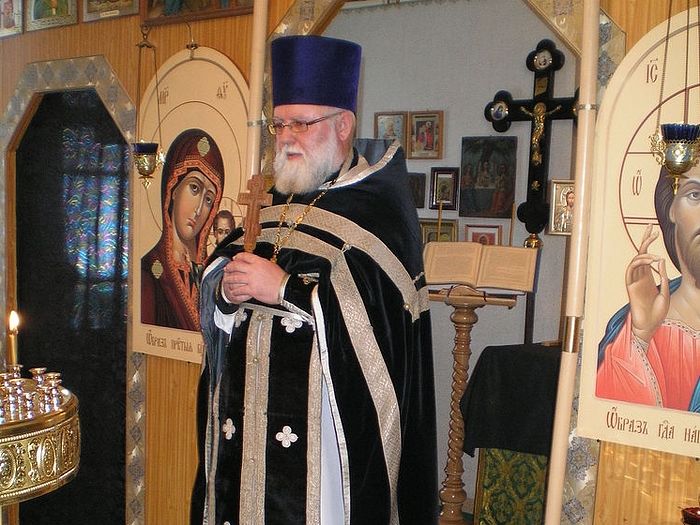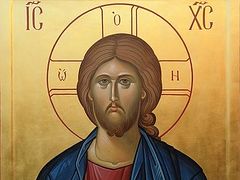Father Alexy Novikov, the rector of the Holy Trinity Church in the Ozerets village of the Tver region explains the difference between true and false humility and talks about “righteous anger”—at what and whom should anger be directed, and whether we should ever resort to anger at all.
—Father, we all love to talk about humility and its importance to us as Christians. The virtue is key to our salvation, so may God help us at least partially attain it. On the other hand, in my opinion, it often happens that the devil, who can seemingly transform into an angel of light (2 Cor. 11:14), distorts the proper understanding of this virtue, presenting it as some kind of blithe indifference and childish behavior. Young people nowadays might call it a “What, me worry?” apathetic kind of attitude. So what’s the difference between these different understandings of humility?
—Indifference is egoism, selfishness. It’s the unwillingness to exert oneself, to labor. A person with such an attitude might think, “I don’t mind what happens around me, that doesn’t concern me—I’m concerned with being humble.” My grandmother Tatyana, who was born in 1903, used to say about that sort of behavior (I’ll soften her words), “Spit in his eye and he’ll say it’s dew from the sky.”
Humility on the other hand is the conscious submission to God’s will, the ability (and desire) to accept with a peaceful state of soul what we often don’t want to accept but what is in accordance with God’s will and necessary for our own good. However, this requires hard, routine work, and often we even have to struggle with ourselves. Humility means an active, productive attitude, while what young people call a “What, me worry?” attitude is a passive and careless refusal to work on oneself motived by laziness. The battle of the person struggling to humble himself will be crowned with victory, while the false humility of the lazy man is cowardice and a retreat from the battlefield.
—Sometimes an active and productive attitude does not have anything to do with humility, although it always refers to it in order to cover itself up. Here I’m talking about aggression, the kind that some Orthodox Christians constantly use in order to “reprove” or “impart wisdom” to their fellow brethren in faith, if not to protest against something. Fr. Alexy, what do you think, why do these “protesters” exist in the Church? What is the nature of their protest, what are they protesting against?
—The fallen nature of Adam has been protesting since the time of the fall of man. Through Adam’s fall we, his descendants, acquired pride, the same pride that much earlier on led to the fall of the angels that had followed Satan. The essence of this “protest” common to all mankind is a protest against the Creator.
Wherever there are people, there is protest. We always protest everywhere: at school, at work, in the kitchen, the government, during travel, in the hospital, when we are both young and old. We protest against our relatives, neighbors, bosses, presidents, emperors, patriarchs, bishops, summer and winter, rain and drought, the traffic light when it’s red, and yes, that’s right, even when it’s green.
The Church, as we already know, is a theanthropic organism, and it’s impossible that there be no protest in its human part. And no matter how it disguises itself, it will always remain the protest of the fallen Adam. It can't be any other way, and this is just something that we have to acknowledge, just as we acknowledge the existence of, for example, mosquitoes or forest fires, floods, diseases. That’s the way it is...
—But can there be such thing as a “healthy protest” in the Church? And how does it differ from a hysterical, unhealthy one? What should we as Christians fight against in the Church? Or should we always humbly nod our heads and support even plainly disturbing, provocative ideas and offences, saying that the ones at the top of the hierarchy know better?
—A healthy protest in the Church is possible and is, first of all, a protest against one’s own passions, against one’s own sins. Against them—not against one another—is what, without a doubt, every Christian must fight, whether they be laymen, priests or bishops; in short—everyone.
When we start protesting against other people’s weaknesses and infirmities without having won the battle against at least one of our sins, without having defeated at least one of our passions, then we instantly become like the ones who are good at noticing the specks in other people’s eyes (Mt. 7:3). Bearing in mind that we ourselves are bereft of the gifts of the Holy Spirit, having started, according to our opinion, a “healthy protest”, we won’t even notice that it too is hysterical, far from being healthy, and is incapable of bringing any results.
—But how does that happen? It seems like a good intention when someone sees blatant injustice and his heart hurts and his soul cries out, and with soul and eyes aflame rushes at the enemy’s battlements, and at the enemy guard post are heretics, ecumenists, lovers of money, sodomites. But they’re usually too ashamed to talk about their own sins...
—The modern understanding of “protest” has driven out of our mind the understanding of “love”. Let’s open up the New Testament, the epistles of the apostles. Is there not a “healthy protest” there? Of course there is! And there’s lots of it. Here’s the apostle Paul, for example: O foolish Galatians, who hath bewitched you, that ye should not obey the truth, before whose eyes Jesus Christ hath been evidently set forth, crucified among you? (Ga. 3:1). Is this not a healthy protest? But on the other hand, what kind of love is at the core of this protest, we can’t even imagine! And above all things have fervent charity among yourselves: for charity shall cover the multitude of sins (1 Pet. 4:8).
—Then what can we do? Maybe I’m all for love! “All you need is love!” as the unreligious musicians from Liverpool sang.
—For love to triumph among those in Church (and then there wouldn’t be any disturbing or provocative offences and ideas, or envy, greed, etc.), love has to first triumph inside one person—me. Or in you. Then, in each parish, where there is either you or I and other people willing to change. Then in each diocese, which consists of a number of parishes, and so on. Correct?
—Yes. I stand at the beginning of this chain; I have to start with myself. And I have to admit that though I and others around me are in need of such love, I do not have it. Period. Perhaps I didn’t listen to the Beatles enough.
—We all listened to the Beatles, and quite a lot... But jokes aside, this rather simple plan is swept aside and replaced by primitive, selfish protest, protest against the “specks” in other people’s eyes.
—So then what should we do? Should we always nod our head and agree with everything that troubles and disturbs us? These kinds of feelings aren’t always the result of egoism. Then let’s just “accept with humility” sodomy, love of money, blatant selfishness etc. under the pretext that we ourselves aren’t perfect.
—I wouldn’t be able to do that. Like my grandmother, I don’t agree that spit and heavenly dew are one and the same substance. And if they drench me in spit I’ll definitely raise my defenses and react. But on the other hand, am I worthy of heavenly dew? That is a question that is more perplexing than the sight of others’ specks in the eye.
As for those at the top of the hierarchy knowing better... Even I myself at my level, at my parish, have had to listen to complaints such as, “why are we using these kinds of light bulbs instead of those”, “why is the heating system organized this way and not that way”, and “why are you, the parish rector, not consulting with us, the parishioners” (but in reality only one person was actually displeased). Furthermore, an alternative was either offered only verbally, rather than in deed, or wasn’t offered at all. I think it’s clear that if I agreed to follow such advice then I’d quickly end up at a dead end.
I remember how in the early 90s one man began leading the life of a church-going Orthodox Christian. There was no internet or social networks back then, and Orthodox books were just starting to be published again; they were often reprints of old publications and were printed on low quality paper. Somehow he managed to find a reprint of the Apostolic Canons, thoroughly studied it and then went around to all of the parishes in St. Petersburg saying, “This parish is not fulfilling such and such a canon, and this one is not fulfilling this canon”, etc. So in the end he never found a parish that was worthy enough, where everything was done according to the book. What happened to him afterwards, I don’t know. I hope he became a good Orthodox Christian.
One more thing. When I was consecrated to the priesthood, one of my former colleagues asked me with a smile, “So, you’re an officer now, huh?” and I, also smiling, replied, “Nope. I just climbed out of the foxhole, that’s all.” And to this day I still have that feeling as though bullets are flying from all sides around me, shells are dropping nearby, but I’m still alive—although I’m just an ordinary village priest. How must priests in the city feel? Or bishops? As long as you remain in the “foxhole”, you won’t ever have this kind of feeling, you’ll never understand it. From inside the “foxhole”, everything is seen at a different angle. Everything seems different.
And here’s one more thing. Speaking about all of these things (protests, the hierarchy), we don’t see past the forest. Who is truly the head? Who is “at the top”? Christ! Can we possibly know better than He does?
—I think not.
—And also, by the way, our desire to control the fate of the Church ourselves reminds me of the dreams the famous hero from the novel by Ilf and Petrov had about publishing the book, “Vasisualy Lakhankin and his role in the Russian revolution”.[1]
—You said it. But you yourself said that criticism and discussion are necessary in the Church.
—Of course. I’ll give a small example. I live in the village and know perfectly well what beeswax is, what its properties are (color, taste, smell, plasticity etc.) and how much it costs. Beeswax, I must say, costs more than honey! But both you and I see so-called “beeswax candles” sold at parishes, small and large church stores and diocesesan warehouses. I don’t know what they’re made of, but it’s not beeswax. And do what you want with me, but this is a scam. It’s a lie. A lie that’s present everywhere where such candles are offered.
One pious Christian once told me: “Do you really care? The candle still burns like any other candle. Does it really matter what it’s made of?”
The thing is that the Church is one of the only, or perhaps the only place where, so to say, “naturalness” is preserved. Where it’s important to hear the voice of the priest or chanter unamplified by a microphone, where real wine is used, where a single real bell that is rung by hand at the appropriate times is preferred over a computerized carillon controlled by the press of a button on a remote. A catholic can even purchase sacramental bread (even a special kind for diabetics!) at any supermarket, while we bake prosphoras for the Liturgy ourselves and know for sure exactly what it is that we’re using for the service.
If they really want to sell those candles at a higher price, well think of a way, but don’t lie! It’s the same as wrapping playdough in a candy wrapper, calling it a truffle and selling it for the same price that truffles go for. And the most amazing thing is that everyone is happy with this “beeswax”, both the sellers and buyers. It says right on the tag: “beeswax”. Who’s forcing them to write that on the tag?
I had to buy a new cassock and bought a cheap cotton one, not cut-out too well (it had to be resewn a bit to fit). The thing cost 9500 rubles. That’s about the same a nice wool coat would cost. And a candle stand costs more than a modern laptop. Where can a village priest get that kind of money from?
—This is just something you remember at random, but how much more venality is out there…
—There are many things that are wrong, but worst of all for the Church is luxury, which is superfluous and absolutely unnecessary. First of all, luxury is a fair reason for protest by both those outside the Church and those in the Church.
Criticism and discussion, of course, are needed (we are all people and none of us are perfect), but they have to be constructive and be based on love, or else it’s all just squabbling, revilement and hatred. Without love, what kind of Christianity or Church will we have?
—Without love, I think most dialogues would take place in a “Who do you think you are?” kind of fashion.
—Exactly. And you won’t see Christ in the midst of such behavior. Likewise, according to Holy Scripture, we let the sun go down upon our wrath (Eph. 4:26). It’s a sad thing




